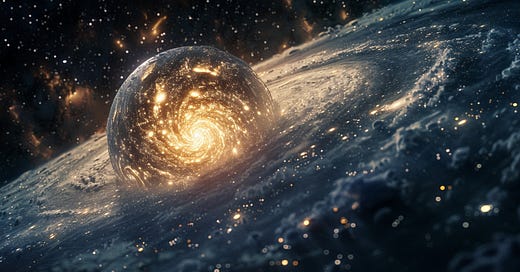One Must Still Have Chaos in Oneself to Give Birth to a Dancing Star
Friedrich Nietzsche on Harnessing Creativity
“One must still have chaos in oneself to give birth to a dancing star.”
In his profound statement, Friedrich Nietzsche not only encapsulated our unique capacity to transform disorder into magnificence but also touched upon the most extraordinary gifts often lying dormant within us.
His coined concept of chaos encompasses all the unbridled forces within us that transcend systemic thought patterns, catalyzing our imagination. These forces are frequently ignited by intrinsic human curiosity and an inherent human desire to explore and think beyond conventional boundaries. Instead of recoiling from this state of disorder, he encourages us to convert it into a beneficial ally, theorizing that it is in that liminal state where authentic thought occurs and genuine creation transpires. Our capacity to tap into chaos, the true mysterious force behind human ingenuity, must be harnessed and turned into a source of originality and authentic creation.
While creative thinking is often perceived as secondary to analytical cognition and knowledge, human originality, imagination, and ingenuity remain the only things no machine can replicate. When recent developments in AI and technology catch up with us and render knowledge—and skill-based jobs obsolete, the value of human creation will lead us toward self-realization and our most profound strength, according to Nietzsche: genuine creative action.
For believe me! — the secret for harvesting from existence the greatest fruitfulness and the greatest enjoyment is: to live dangerously!
It is this willingness to tap into the seemingly chaotic and disordered, combined with courage and strength, that enabled the genius of Marie Curie to discover a new radioactive element, paving the way for modern cancer treatments and nuclear energy for millions of people.
The danger and necessity of surpassing conformist or sanctioned cognitive structures and systems to gain access to the chaos of ingenuity are not merely obstacles—they are the way.
He argues that every transformative breakthrough requires a certain level of disorder or chaos. The courage and openness to embrace the unknown, the uncertainty, and the disruption it brings are as much a part of creating something new from scratch as the ability to handle the overall messiness of every new beginning.
The common misconception that creative expression only revolves around creating tangible art and the widespread belief that innovation and creative thinking are the sole prerogatives of isolated geniuses is another self-imposed barrier that often hinders our exploration of creativity.
We express our inert human creativity as much through inventive problem-solving and the mastery of chaotic emotions as we do while delving into the intricacies of particle physics or immersing ourselves in painting magnificent masterpieces. However, when we broaden our viewpoint, it becomes apparent that our creativity and imagination influence everyday aspects of how we perceive our environment, communicate with one another, and address life’s challenges.
These abilities reside within each of us, often obscured by our habitual thought patterns. We need merely to cultivate techniques that remind us how to harness these innate capacities of perception and transformation effectively on a grand scale and in everyday life.
We all carry the potential to give birth to a dancing star once we trust our ability to dive into chaos with all its unbridled forces of uncertainty, arbitrariness, and potential turmoil. Through our will to create and our inherent power to transform, even minor acts and arbitrary encounters become a chance to translate humanity back into nature and manifest our unique spirit.
We create beauty from chaos every day.
The dedicated healthcare worker creating the ideal environment for healing and recovery in the face of anguish and disease, the loving parent transforming an inanimate house into a home, and the people who keep our public spaces clean and our gardens green—all of them share this great gift within all of us and are mostly oblivious to it.




